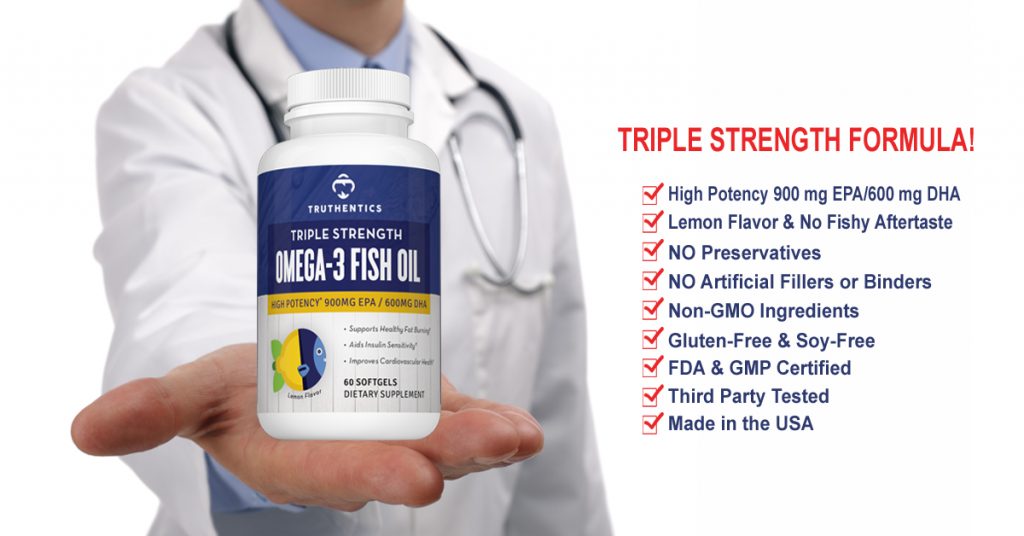It’s no secret that Omega-3 fats are essential to your overall health. Health and medical experts have been stressing this to their patients and the public after decades of research have been devoted to discovering the many proven health benefits of Omega-3.
But perhaps the most important impact that taking an Omega 3 Fish Oil supplement has is on your body’s internal machinery: your Metabolism.
What Are Omega-3 Fatty Acids?
The Omega-3 fatty acids are polyunsaturated fatty acids. They are quite essential for a healthy metabolism, but our bodies are unable to synthesize them. We either use shorter chain omega-3 fatty acid ALA through diet and use the same as long-chain omega-3 fatty acids namely EPA (eicosapentaenoic acid) and DHA (docosahexaenoic acid), or we take it from the external sources. The cold-water oily fish like salmon, mackerel, herring, sardines, and anchovies are excellent sources of EPA and DHA.
What Happens When Your Metabolism Slows Down
The food we eat is broken down (digested) and either gets burned (oxidized) due to the efficient processing machinery (metabolism) in your body or gets stored up in the body when your metabolism has slowed down. When the latter happens, it leads to fat accumulation. The result is obvious – weight gain.
The other effects of slow metabolism are as follows:
- Lethargy and chronic fatigue
- Thinning hair or hair loss
- Skin issues
- Difficulty losing weight or maintaining it
- Loss of muscle mass
- Headaches
- Concentration issues
- Increased cravings for sugary foods
Your lifestyle, eating habits, and physical activity habits influence your metabolism. Thereby, it’s always advisable to avoid sedentary lifestyle or at least compensate for it by exercising on a regular basis.
Omega 3 Fish Oil Keeps Your Metabolism From Going “South”

Ordinarily, too much fat in your diet (in the presence of too much carbohydrate) is usually the contributor to excess body fat. But the exception is omega-3 fatty acids.
An omega-3 fatty acids (EPA and DHA) rich diet can aid in lowering your total body fat storage. That’s the reason that certain cold-water fish has its place in all the bodyweight-reduction diet charts. It supplies not only the proteins but also the omega-3s needed to support and even boost your metabolism naturally.
In fact, consuming omega 3 fish oil helps you burn a few hundred more calories per day. It increases thermogenesis (the metabolic process during which your body burns calories to produce heat), prevents muscle breakdown as a result of exercise and aging, and has an anti-lipogenic effect (reduction in fat-storage).
Bottom line: A more efficient and faster metabolism can help you burn more calories each day and lose weight if that is a personal goal you are striving for.
The Benefit & Convenience Of Taking An Omega 3 Fish Oil Supplement
The perk of consuming a high-potency Omega 3 fish oil supplement rather than having fish as a meal every day is that you won’t get bored with the same food. Some of us don’t even like having fish in our meals. Also, an Omega 3 fish oil supplement is easy to consume on a daily basis.
But how much should you take? Is there a difference in quality between Omega 3 fish oil supplements? What concentration should you look for in an Omega 3 fish oil supplement?
All great questions… here are the Guidelines we found to be best for supporting your metabolism and other systems in your body for optimum health.
Dosage & Concentration
EPA and DHA dosage recommendations can vary depending on your age and health. And many Omega 3 supplements only contain up to 1,000 mg of fish oil per serving, and of that amount, they only contain 300 mg of EPA and DHA.
But to help improve your metabolism and thus lose or manage your weight easier, we’ve found that a higher potency of 1800 mg of pure Omega 3 Fish Oil per day is essential to see results. And of the 1800 mg of pure Omega 3 Fish Oil, the breakdown of essential fatty acids should look like this:
- EPA (eicosapentaenoic acid): 900 mg per dose
- DHA (docosahexaenoic acid): 600 mg per dose
- Other Omega 3 Fatty Acids: 300 mg per dose

Processing & Purity
Many fish oil supplements on the market don’t contain the purity or are processed properly when tested by independent labs. As an educated consumer, you should look for an Omega 3 Fish Oil supplement that has gone through the put through a molecular distillation process prior to encapsulation. Molecular distillation separates, purifies and concentrates the Fish Oil and removes any contaminants like heavy metals including mercury, lead, arsenic and cadmium. This ensures the product is pure and safe for consumption.
That’s why you should always choose an Omega 3 Fish Oil supplement that is “third-party tested” like the Truthentics Omega 3 Fish Oil.
Best Time To Consume
Other dietary fats help the absorption of omega-3 fatty acids. Therefore, it’s best to take your Omega 3 Fish Oil supplement with a meal that contains some fat.
Rich Farina, M.S. is a Metabolic Health and Conditioning Specialist with over 30 years of experience helping thousands of individuals lose weight, rebuild their metabolisms, and improve their health in his Metabolic Testing & Weight Loss Centers.
He holds both Bachelor of Science and Master of Science degrees in Exercise Physiology and Public Health respectively and is a passionate advocate of using proven, scientific principles in his approach to exercise and nutrition.
He is a contributing author, professional speaker, and advisor on topics that include weight loss, human performance, and medical fitness.
He continues his deep-seated passion to help people improve their health and longevity through his own line of premium, all-natural nutritional supplements called Truthentics™. The Truthentics™ brand of nutritional supplements is specifically designed to help people compensate for nutritional deficiencies and bring their bodies back into balance.









